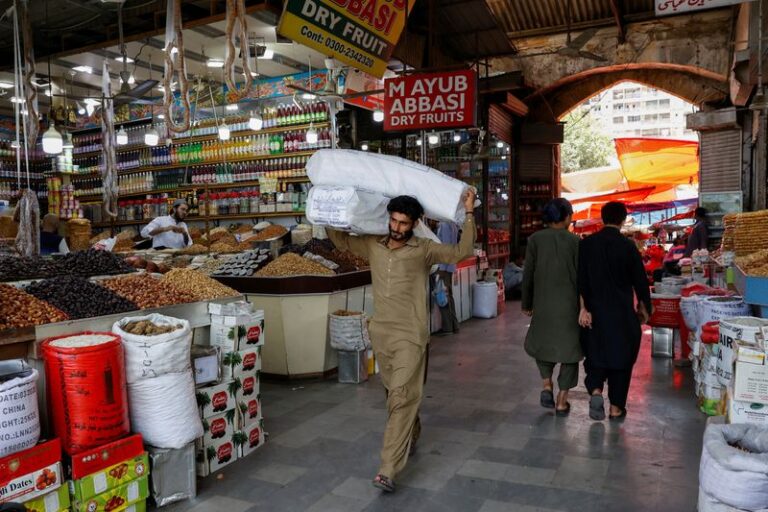Ariba Shahid
ISLAMABAD (Reuters) – Pakistan’s plans to raise taxes and raise state revenues in its 2024-25 budget will help it win International Monetary Fund approval for loans to avert a new economic collapse but could also stoke public anger, former finance officials, experts and businesspeople said.
The South Asian country has set a tax collection target of 13 trillion rupees ($47 billion) for the year starting July 1, up nearly 40 percent from the current fiscal year, and will sharply reduce its fiscal deficit to 5.9 percent of GDP from 7.4 percent this fiscal year.
Pakistan needed to reduce its budget deficit as part of negotiations with the IMF to avoid defaulting on its debt for the region’s slowest-growing economy, with which it is in talks for a loan of between $6 billion and $8 billion.
“If the budget is approved as presented, it will be enough to qualify for an IMF program,” said former finance minister Miftah Ismail, but he said the revenue target would be difficult to meet, as would the 3.6 percent growth target.
“These two things cannot happen simultaneously,” said Ismail, who as finance minister then successfully negotiated the revival of Pakistan’s last Expanded Fund Facility (EFF) programme in 2022.
Outside analysts broadly agree: Methodi Tsanov of Emerging Markets Watch believes the current budget should be acceptable to the IMF.
“The government has met almost all the requirements to comply with the IMF’s conditions, including removing tax exemptions, raising corporate taxes on exporters, increasing personal income tax rates, tightening restrictions on non-filers and increasing taxes on fuel,” he said.
But some say the IMF could balk if it sees tax targets as unrealistic.
Presenting the budget for the first time, Finance Minister Muhammad Aurangzeb said a staff-level agreement with the IMF would be signed in July.
The IMF made no immediate official comment on the budget and did not respond to questions from Reuters.
The large increase in tax revenue targets consists of a 48 percent increase in direct taxes and a 35 percent increase in indirect taxes. Non-tax revenues, including petroleum taxes, are expected to increase by a staggering 64 percent.
In particular, taxes have been tightening on previously protected export-oriented sectors such as the textile industry, which consistently accounts for more than half of Pakistan’s exports and whose revenues help contain a high current account deficit.
The All Pakistan Textile Mills Association, the industry’s representative body, called for a review of the budget, calling it “highly regressive” and “threatening to collapse the textile sector and its exports.”
“This would have dire consequences for jobs, external sector stability, and overall economic and political stability and security,” the report warned.
The Pakistan Business Council also called for a review of the budget measures.
“The budget prioritizes securing a new EFF from the IMF, but lacks innovation to grow the domestic economy,” said Musadaq Zulqarnain, director of the Pakistan Textile Council and chairman of Interloop, one of Pakistan’s largest textile manufacturers.
Prime Minister Shehbaz Sharif’s coalition government does not have the luxury of a parliamentary majority that would help it pass the budget smoothly.
To stick to their reform measures, they will need to withstand opposition not only from key economic sectors but also from a general public already indignant at the prospect of further price increases.
Mr Sharif’s party has had to convince its biggest ally, the Pakistan People’s Party (PPP), because it cannot win a majority without it, and the PPP said it was not happy with some of the measures.
But former Citibank analyst Yousaf Nazar believes the protests are just political posturing: “They’re not going to rock the boat,” he said.
There are few short-term options to support Pakistan’s recent stability, making an IMF program seem crucial.
Expanding the tax base takes considerable time and effort in an economy where proper documentation is often lacking: Pakistan’s undocumented parallel economy is huge, with 44 percent of nominal GDP contributing little to direct tax revenues, according to tax firm Torah Associates.
In particular, politically influential traders and farmers have resisted government pressure to register and keep records of sales.
“If the tax base does not expand going forward, the nation’s tax revenue growth could decline further, creating a burden on the economy,” Torla Associates said in a note.
“The real challenge is implementation,” said Reza Baqir, a former central bank governor and managing director at Alvarez & Marsal.
“For example, this budget targets an ambitious increase in the tax-to-GDP ratio. Many past budgets have targeted similarly ambitious improvements. Hopefully, lessons learned from why those ambitious targets were not realised will be reflected in this budget.”
(Reporting by Ariba Shahid in Islamabad; Additional reporting by Mark Jones in London; Writing by Gibran Peshimam; Editing by Kevin Liffey)

